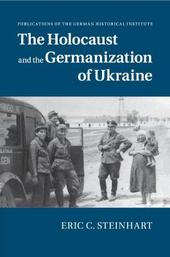
|
The Holocaust and the Germanization of Ukraine
Paperback / softback
Main Details
| Title |
The Holocaust and the Germanization of Ukraine
|
| Authors and Contributors |
By (author) Eric C. Steinhart
|
| Series | Publications of the German Historical Institute |
|---|
| Physical Properties |
| Format:Paperback / softback | | Pages:275 | | Dimensions(mm): Height 229,Width 151 |
|
| Category/Genre | The Holocaust |
|---|
| ISBN/Barcode |
9781107659452
|
| Classifications | Dewey:940.5318094779 |
|---|
| Audience | | Professional & Vocational | |
|---|
| Illustrations |
10 Halftones, unspecified; 10 Halftones, black and white
|
|
Publishing Details |
| Publisher |
Cambridge University Press
|
| Imprint |
Cambridge University Press
|
| Publication Date |
22 November 2018 |
| Publication Country |
United Kingdom
|
Description
The German invasion of the Soviet Union during the Second World War was central to Nazi plans for territorial expansion and genocidal demographic revolution. To create 'living space', Nazi Germany pursued two policies. The first was the systematic murder of millions of Jews, Slavs, Roma, and other groups that the Nazis found undesirable on racial, religious, ethnic, ideological, hereditary, or behavioral grounds. It also pursued a parallel, albeit smaller, program to mobilize supposedly Germanic residents of Eastern Europe and the Soviet Union - so-called Volksdeutsche or ethnic Germans - as the vanguard of German expansion. This study recovers the intersection of these two projects in Transnistria, a portion of southern Ukraine that, because of its numerous Volksdeutsche communities, became an epicenter of both Nazi Volksdeutsche policy and the Holocaust in conquered Soviet territory, ultimately asking why local residents, whom German authorities identified as Volksdeutsche, participated in the Holocaust with apparent enthusiasm.
Author Biography
Eric C. Steinhart earned a Ph.D. in history from the University of North Carolina, Chapel Hill in 2010. His dissertation received the 2011 Fritz Stern Prize from the Friends of the German Historical Institute for best doctoral dissertation on German history written in North America. From 2009 until 2012, he worked as a historian for the United States Holocaust Memorial Museum's Center for Advanced Holocaust Studies, serving as the Curt C. and Else Silberman International Tracing Service Research Scholar.
Reviews'Meticulously analyzing the interactions between ethnic Germans and the SS murder troops in Transnistria, Eric C. Steinhart shows how Nazi rule turned neighbors into mass murderers. The Holocaust and the Germanization of Ukraine is a fascinating and yet disturbing inquiry into one of the least researched areas of the Holocaust, well written and based on a huge amount of newly discovered archival sources - an outstanding model of a micro-history.' Thomas Kuhne, Clark University, Massachusetts 'Clearly written and argued, and based on new archival research, this is an important book for scholars of the Holocaust, eastern European and Soviet history, and twentieth-century Europe.' Wendy Lower, Claremont McKenna College 'This book is a thoroughly researched and well-organized study of the Holocaust and Nazi German occupation policies in the southern Ukraine region called Transnistria by the Romanians who joined in the invasion of the Soviet Union in 1941 ... Highly recommended. Most levels/libraries.' Choice 'This excellent micro-history is based on the author's Ph.D. thesis, which received the 2011 Fritz Stern Prize from the Friends of the German Historical Institute for best doctoral dissertation written in North America on German history ... Steinhart conveys the results of an impressive amount of artfully conducted research, and his lean and muscular prose is a model of clarity and efficiency. His book deserves to be widely read.' Dan McMillan, Holocaust and Genocide Studies 'Steinhart has provided a meticulously researched case study that combines new approaches to Germanization and genocide. ... Steinhart does not fall back on easy explanations, but he provides a compelling argument that shows how motives for murder changed over time in one major site of the Holocaust.' Winson Chu, The Journal of Modern History 'Steinhart has written an engaging, highly illuminating study of the relationship between the ideologues of the Third Reich and the complex reality they encountered on the ground as they attempted to remake eastern Europe into a racially ordered imperium founded on genocide.' Paul Moore, H-Nationalism
|